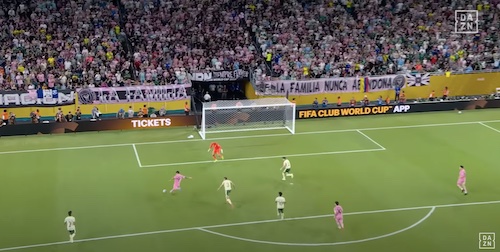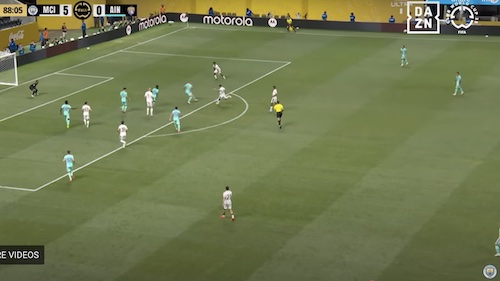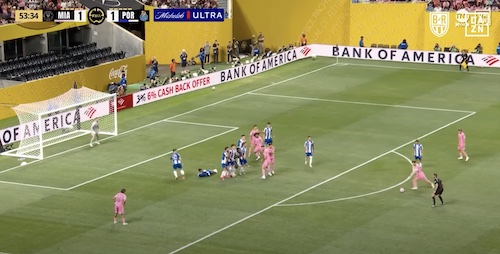Yes, soccer is an emotional and competitive sport. And that’s why we love to play it and watch it.
Quote: “I am very mistrustful of people who are constantly over intellectualizing things. It kills passion. You have to allow yourself to lose control from time to time.”
Who said the above quote? Manchester United’s Eric Cantona.
While this quote is true, in soccer, you need to have control of your emotions so you don’t let them get the better of you. If you get too emotional, you might overreact and get a red card or let one mistake get you down and effect your game. So it’s a balancing act, where you want to play with intensity but also remain calm so you’re ready to slot the ball home when given the chance to score.
You can learn a lot from watching the greats in the game of soccer. Sometimes you might just need a role model to emulate while on the field. When you’re getting ready to play, visualize a player you admire and adopt their style of play.
For example, you can see how Eric Cantona played with confidence at Manchester United. Or consider the free flowing style of Ronaldinho, or the toughness of Roy Keane. But keep in mind that everyone is human. Even greats such as Eric Cantona make mistakes and let their frustrations get the better of them. These are situations where their emotions took over and they made a terrible mistake. Remember Cantona’s karate kick on a fan, and Zidane’s head butt in the World Cup final!
Anger, frustration, happiness and joy… there are many emotions in the beautiful game. Enjoy the best reactions from Bob Bradley to Zlatan Ibrahimovic.
You’ll discover that these soccer greats are passionate about playing the game they love. If they weren’t, there would be no reason to react so emotionally. Also, you’ll quickly remember that the greats are still human, which means that even they have breaking points and can make bad decisions. So focus on playing passionate soccer — invoking Keane’s, Cantona’s desire, and Zidane’s enthusiasm — but remain calm and collected with your emotions in check.
Soccer Is Just A Game
Don’t go into a game like it’s a do-or-die situation. Remember, it’s still a game, and as such, it should be fun! To help treat a game as a fun activity, just keep telling yourself to stay in the moment. What does this mean? Well, basically it means you shouldn’t rush things, and that you should know what you want to do with the ball when you get it. And if you make a mistake, you forget it and work hard to win the ball back.
And be realistic about what you want to do, be confident that you can do it, and be happy when you can make that contribution. Sometimes in order to make a big play you have to make several smaller ones. Or in order for a teammate to make a play you have to assist him. But always remember: pass the ball and keep moving. If you make a bad pass, forget about it! Everyone makes mistakes. Just get back into the game and keep the momentum alive. If you focus on doing that, you’re sure to play well.
No matter what, you’re probably going to be nervous during a game because you want to do well and you love to compete. Learn to work with your nerves. Remember that because you know how to play, you should focus on making the next play better than the last. Practice makes perfect, right? So, keep playing! We all have games where we might not play our best. So what? Just adjust your playing accordingly and work hard on defense. Hustling usually gets you out of a rut! For example, it’s not uncommon for Ronaldinho to make bad passes or lose the ball, but he does it in areas on the field where he can take risks.
Ultimately, take mistakes or not playing well as a challenge. Realize that the game is not over until the final whistle and play tough to the end. Play strong and with your head up and think positively. Don’t punish yourself but realize that everyone makes mistakes. People will remember not the mistake you made but how you fought back and your team won.
Quote by Patrick Viera to Francesc Fàbregas
Vieira came up to me and I’ll never forget his words.
“He said that I was 17 years old and would have at least another 15 seasons as a professional and, most likely, I would have many other really bad games ahead of me. He said that it was impossible to perform at 100 per cent every match and that those outside football who demanded it did not understand the game. He said that what mattered was giving 100 per cent, knowing that you might not get 100 per cent back from your performance. And that I shouldn’t worry and beat myself up over it, but continue working hard.
“His words had a massive impact on me, not least because he was my captain and a guy who played in my position on the pitch.”
Learn more about mental focus for soccer:















